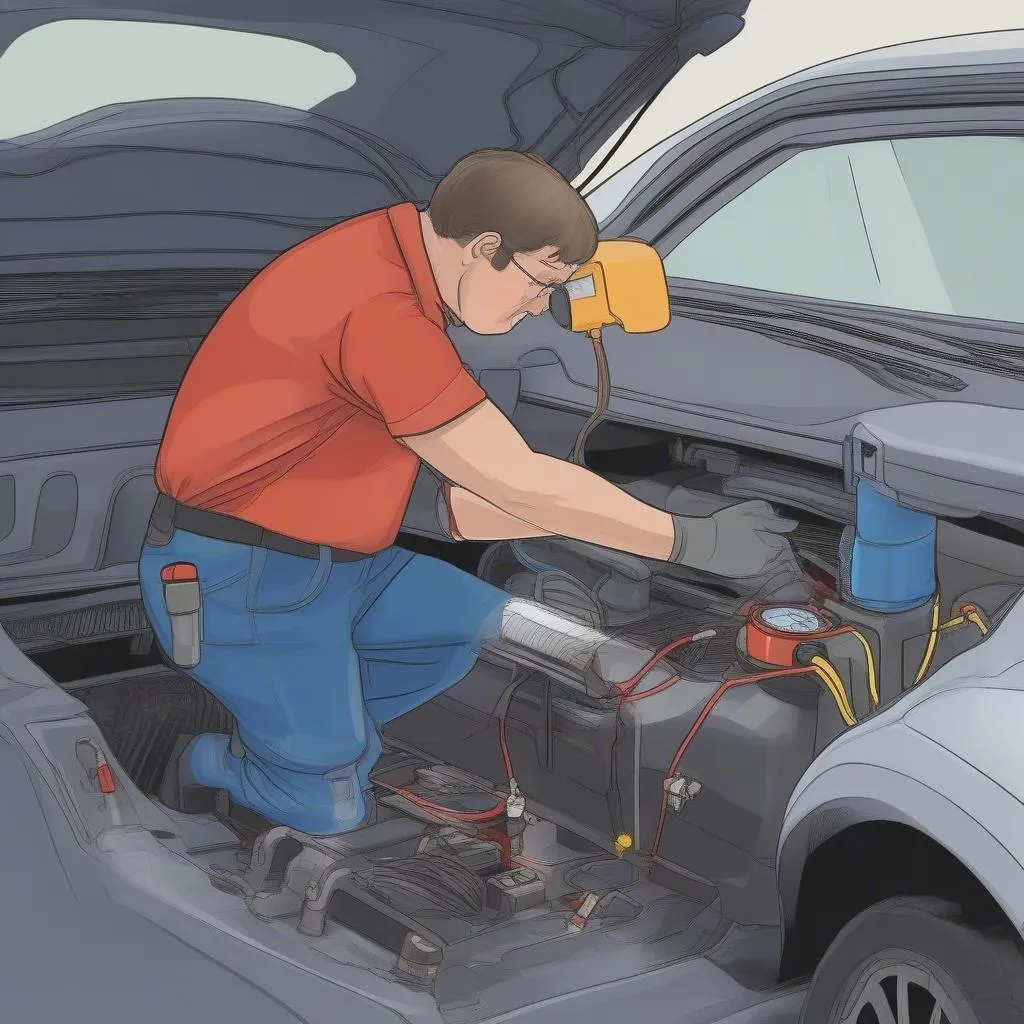Imagine this: It’s a scorching summer day, and you’re driving down the road with the windows down. You turn on the AC, but instead of a blast of cool air, you’re greeted with a lukewarm breeze. Frustrating, right? This is a common problem that many car owners face, and it can be a real pain, especially during the hottest months of the year.
Understanding the Problem: Why Your Car AC Isn’t Blowing Cold
When your car AC isn’t blowing cold, it’s usually a sign of a problem somewhere in the system. But what exactly is causing the issue? Let’s break it down:
1. From a Mechanic’s Perspective:
Think of your car’s AC system as a refrigerator on wheels. It uses refrigerant to cool the air, and it’s important that the refrigerant levels are correct and the system is working properly. If there’s a leak, the refrigerant can escape, reducing the cooling power.
2. From a Technical Perspective:
The car’s AC system is a complex network of components that work together to regulate temperature. These components include the compressor, condenser, evaporator, and expansion valve. Any malfunction in these parts can impact the AC’s performance.
3. From an Economic Perspective:
A non-functional AC can have serious consequences for your car’s value and your own comfort. If you are unable to enjoy a comfortable ride, the car’s value will be affected, and you’ll have to endure uncomfortable temperatures until the problem is fixed.
Diagnosing the Issue: What Could Be Wrong?
1. Low Refrigerant:
This is the most common reason for a car AC that isn’t blowing cold. Refrigerant is a key component in the cooling process, and when it leaks out, the system won’t be able to function properly. It’s essential to check the refrigerant levels regularly and top them off if needed.
2. Compressor Malfunction:
The compressor is responsible for circulating the refrigerant through the system. If the compressor fails, it won’t be able to circulate the refrigerant, and the AC will stop working.
3. Clogged Condenser:
The condenser is a component that dissipates heat from the refrigerant. If the condenser becomes clogged with dirt or debris, it can hinder the heat transfer process and reduce the AC’s efficiency.
4. Clogged Evaporator:
The evaporator is responsible for absorbing heat from the air inside the car. If the evaporator becomes clogged with dust or dirt, it won’t be able to absorb heat efficiently, and the AC will struggle to cool the air.
5. Faulty Expansion Valve:
The expansion valve regulates the flow of refrigerant into the evaporator. If the valve malfunctions, it can cause the system to over-cool or under-cool, impacting the AC’s performance.
6. Electrical Problems:
The AC system is controlled by a complex electrical system. A faulty relay, wiring issue, or blown fuse can disrupt the system’s operation and prevent the AC from working properly.
Tips for a Cool Ride: How to Address the Issue
1. Regular Maintenance:
The best way to prevent AC problems is to schedule regular maintenance checks. This includes checking the refrigerant levels, cleaning the condenser and evaporator, and inspecting the entire system for leaks or malfunctions.
2. DIY Solutions:
For simple issues like low refrigerant, you might be able to top it off yourself. However, it’s important to be aware of the potential dangers of working with refrigerants and consult with a professional if you are unsure.
3. Professional Help:
If you suspect a more complex problem, it’s best to seek professional help. A qualified mechanic can diagnose the issue and recommend the appropriate solution.
Frequently Asked Questions
1. Can I add refrigerant myself?
While you can add refrigerant, it’s not recommended for the average car owner. The process involves specialized equipment and knowledge, and improper handling can lead to injury or damage to the system.
2. How often should I have my AC serviced?
It’s recommended to have your AC serviced at least once a year, particularly before the start of the summer season. This will help to ensure that the system is working properly and prevent costly repairs down the line.
3. What are the signs of a failing AC compressor?
A failing AC compressor might produce a rattling or grinding noise, or the AC might completely stop working. If you notice these symptoms, it’s important to take your car to a mechanic for diagnosis and repair.
Further Exploration
For more in-depth information on car AC systems, including troubleshooting tips and common problems, check out our other articles:
- [link to related article 1]
- [link to related article 2]
Take Action
If your car AC isn’t blowing cold, don’t wait! Contact us today for a professional diagnosis and repair. We’re available 24/7 to help you get back on the road in comfort.
Whatsapp: +84767531508
 Car AC Low Refrigerant Leak
Car AC Low Refrigerant Leak
 Car AC Compressor Failure
Car AC Compressor Failure


